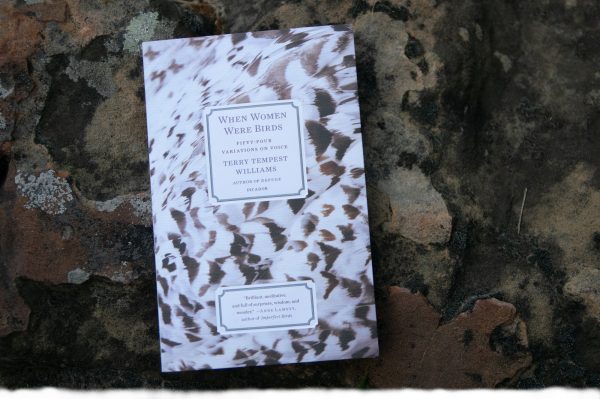Book Review: When Women Were Birds
by Terry Tempest Williams

5 August 2019 | Theme: Voice | 5-Minute Read | Listen
Even before I started DoYouMind.life, one facet of the project that I knew absolutely had to happen was a monthly book review of a book related to the theme. It’s a jumping-off place for conversation that is immeasurably valuable, a way to deepen the discussion.
When I received feedback last month from women who are reading the book I recommended (It’s About Time: The Art of Choosing the Meaningful Over the Urgent by Valorie Burton), I found that women really DO want to be in conversation about these themes, and that many are grateful to have a books they can add to their reading lists. This led me to realize that it would be far more helpful for me to publish the reviews early in the month rather than later so that theme-based conversations can happen throughout the month.
This month, my choice of books for the theme of Voice is When Women Were Birds: Fifty-Four Variations on Voice by Terry Tempest Williams.
I learned of Williams’s book a little over a year ago when it was the title my book club decided to discuss. I was jarred by the first sentence: “I am fifty-four years old, the age my mother was when she died,” because, as it happened, I read that sentence on my fifty-fourth birthday.
Williams’s mother told Terry that she was leaving her daughter all her journals, but that Terry wasn’t to look at them until after the mother was gone. A week later, during a full moon, her mother died. As the next full moon shone through the window of the family home, Terry was drawn to look at the journals. She took down the first from the shelf and opened it. It was empty. The second journal. Empty. And the third, the fourth, the fifth—shelf after shelf, all the journals were completely blank.
Williams spends the rest of her book trying to understand the meaning of her mother’s blank journals—fifty-four interpretations, hence the subtitle Fifty-Four Variations on Voice.
According to Williams, “In Mormon culture, women are expected to do two things: keep a journal and bear children.” Her mother bore four children, and “kept” journals in her own way—enigmatically purchasing and keeping journal after journal, but never making a single mark in them.
This is especially puzzling to Williams, who is a writer. For her, words are precious and beautiful, but she also recognizes the power of silence. She compares her mother’s journals to John Cage’s composition known as 4’ 33’’ –four minutes and thirty-three seconds of “silence” as the pianist sits before a closed piano lid—and to Robert Rauschenberg’s White Paintings. “My Mother’s Journals are a ‘harmony of silence,’” she writes.
Some of the women in my book club were annoyed by the ambiguity presented by these blank pages. They wanted a definitive answer as to why a woman would so steadfastly add to her journal collection, but never write a word in them. I, on the other hand, was intrigued by the many meanings Williams assigns to the blank pages.
She writes, “My Mother’s Journals are the power of absence. My Mother’s Journals are the power of presence.” Later, she adds, “My Mother’s Journals are written in code.” She ponders the meaning of voice—her mother’s voice was the first voice she ever heard. Her mother helped her to learn to listen to the calls of birds, hearing their distinct voices. “My Mother’s Journals are a writer’s block. My Mother’s Journals are a writer’s conceit.”
I was moved by Williams’s description of finding her own voice. As a fourth grader, young Terry spoke with a lisp, so she was sent to a speech therapist three times a week. Her dedicated and insightful speech therapist taught her to speak beautiful words, and Terry fell in love with the sounds of poetry. She writes, “I did not find my voice—my voice found me through the compassion of a teacher who understood how poetry transforms us through the elegance and lyricism of language.” Her mother had taught her to listen; Mrs. Parkinson taught her to sing.
In When Women Were Birds, Terry Tempest Williams carefully crafts a story—her story—that interweaves her relationship with her mother and family, her faith, her love of nature, and images of birds along with strong feminine theme. Through multiple lenses, she examines what it is to have and to use a voice, as well as what it is to choose to remain silent.
With its central question left unanswered, When Women Were Birds is moving and thought-provoking. I’d love to be in conversation about it with some of my readers this month. If you’re interested in participating in a book discussion, please leave a comment on the Contact Us page!
Until next time,

If you enjoyed this article,
please share on social media!
NEXT ARTICLE

Speaking Up
8 August 2019 | Theme: Voice | 7-Minute Read
The little girl jumped off her bike, allowing it to fall to the street. She paid no heed to whether her beloved pink bike would be scratched or her handlebar tassels torn; she ignored everything but the fire that burned in her gut as she strode toward the man in the suit. “Stop it!” she yelled at him . . .